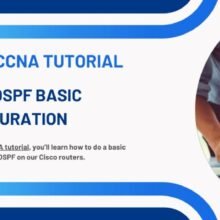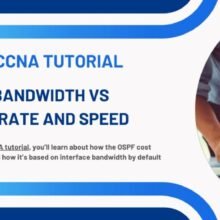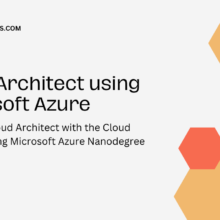Cisco OSPF Basic Configuration In this Cisco CCNA tutorial, you’ll learn how to do a basic configuration of OSPF on our Cisco routers. Scroll down for the video and also text…
The Best Cloud Security Certifications to Boost Your Career
When you’re trying to identify the best cloud security certifications, you’re very quickly confronted with a large and sometimes confusing mix of possible options. So before you jump in with preparation, it’s important to get some perspective on what’s out there and hone in on the cloud certifications that align best with your goals.

Beginner Certifications
By “beginner”, we mean a beginner to the specific topic of cloud security. We’re assuming that you have at least foundational knowledge of the composite parts of this, i.e. cloud architecture and cyber security already.
These are precisely the type of certifications that can boost your chances of securing junior roles in organizations that rely heavily on cloud-based services. They can also be a useful stepping stone to more advanced or specialist cloud security certifications.
Certified Cloud Security Knowledge (CCSK)

Platform
Vendor-neutral
Details
Certified Cloud Security Knowledge (CCSK) is a popular and widely-recognized foundational certification from the Cloud Security Alliance (CSA), a global not-for-profit that seeks to promote the best practice surrounding security in cloud computing.
CCSK is designed to demonstrate your knowledge of what it takes to develop a security program for a cloud environment. Topics covered are organized into the following domains:

- Cloud Computing Concepts and Architecture
- Governance and Enterprise Risk Management
- Legal Issues, Contracts, and Electronic Discovery
- Compliance and Audit Management
- Information Governance
- Management Plane and Business Continuity
- Infrastructure Security
- Virtualization and Containers
- Incident Response
- Application Security
- Data Security and Encryption
- Identity, Entitlement, and Access Management
- Security as a Service
Assessment consists of a single, open-book 90-minute examination comprising 60 multiple-choice questions. The passing score is 80%. Full syllabus details can be found in this CCSK guide.
Requirements
This is an entry-level certification with no hard requirements for previous accreditations or work experience.
However, if you are a complete novice in this subject, it is recommended that you pick up some basic knowledge of the security fundamentals (e.g. encryption, firewalls, and identity management) before you commence CCSK preparation.
Cost
It costs $395 to purchase the exam. For this, you get two test attempts, which can be used within two years.
Why is it our choice?
The long list of topics covered in the CCSK exam speaks for itself. This certification is a really good choice in helping you demonstrate knowledge of the fundamentals of pretty much all aspects of cloud security.
For junior roles where you’ll be working with cloud architecture (e.g. security analysts and security administrators), CCSK can certainly help boost your employability.

It’s also a very good stepping stone for more advanced qualifications. In particular, for (ISC)2’s higher-level Certified Cloud Security Professional (CCSP), the entry requirement of five years of work experience is reduced to four years if you already have CCSK.
CompTIA Secure Cloud Professional (CSCP)

Platform
Vendor-neutral
Details
CompTIA Secure Cloud Professional (CSCP) is a junior-level certification from CompTIA, a globally-recognized IT trade body that offers a wide range of industry-standard certifications.
This is a stacked certification. In other words, you earn it by passing multiple CompTIA certifications. To gain your CSCP, you’ll need to pass the following exams:
- CompTIA Security+
- CompTIA Cloud+
You can learn more about how this works in CompTIA’s Stackable Certifications Guide.
CompTIA Security+
This is a vendor-neutral certification designed to help you build and validate your knowledge relating to the type of security issues you’ll encounter across a wide range of network environments, both cloud and on-premise.
It focuses on the following broad concepts:
- Assessing the security posture of an enterprise environment and the knowledge necessary to recommend and implement appropriate security measures.
- Monitoring and securing hybrid environments, including cloud, mobile, and IoT.
- Operating with an awareness of applicable laws and policies, including principles of governance, risk, and compliance.
- Identifying, analyzing, and responding to security events and incidents.

Tip: for more information on what’s required for this element of the CSCP certification, check out our guide, 10 Tips to Pass the CompTIA Security Exam on Your First Try.
CompTIA Cloud+
The CompTIA Cloud+ certification is designed to demonstrate that you have the theoretical and practical know-how to implement, maintain and deliver the type of technologies that exist in a cloud environment (e.g. network, storage, and virtualization).
The topics covered are represented in the exam as follows:
- Configuration and Deployment (24%)
- Security (16%)
- Maintenance (18%)
- Management (20%)
- Troubleshooting (22%)

Requirements
There are no hard requirements for previous certifications to take either the CompTIA Cloud+ or Security+ exams.
However, for each exam, CompTIA recommends developing a level of knowledge commensurate with 2-3 years of experience in systems administration or networking. However, if you are lacking in that actual work experience, it’s possible to gain an equivalent level of knowledge through suitable learning materials and courses.
Cost
- Security+ (Exam Code SY0-601) $392
- Cloud+ (Exam Code CV0-003) $358
- Combined Cost: $750

Why is it our choice?
Particularly useful if you have one of these two certificates already, CompTIA’s stackable approach allows you to ‘level up’ your career credentials. CSCP is an effective way of demonstrating your practical and theoretical ability in BOTH security and the management of cloud environments.
Courses
Azure Security Engineer Associate

Platform
Microsoft Azure
Details
This Microsoft certification validates your ability to implement, manage and monitor security for resources in Azure multi-cloud and hybrid environments.
The certification demonstrates your familiarity with the issues that are likely to arise as a security engineer within an Azure setting. This includes managing an organization’s security posture, identifying vulnerabilities, threat modeling, and incident response.
Certification content is broken down as follows:
- Managing identity and access (25-30%)
- Secure networking (20-25%)
- Secure compute, storage, and databases (20-25%)
- Managing security operations (25-30%)

Assessment consists of a single 120-minute exam comprising 40-60 questions. The passing score is 70%. More details can be found in this Microsoft study guide.
Requirements
There are no hard requirements. However, Microsoft stipulates that you should have practical experience in the administration of Microsoft Azure and hybrid environments.
Cost
$165
Why is it our choice?
A lot of the potential employers you approach will rely on Microsoft Azure services. If you are a relative novice when it comes to security, but you are already familiar with Microsoft services, this certification is a very effective way of helping you step up into security engineering roles.

Courses
If you need to brush up on the essentials of Microsoft Azure, this course may be ideal:
Want to Download All Our Premium Cheat Sheets?
No Problem! Just enter your email address, and we’ll send you the PDF versions of all our top cheat sheets.
VMWare Certified Technical Associate – Security 2023

Platform
VMWare
Details
Some businesses rely exclusively on cloud applications and architecture hosted by service providers such as Microsoft and Amazon (known as the public cloud). Others have a private cloud model in place; i.e. they own and control all the infrastructure within their cloud environment. A hybrid model is also common, whereby some components are delivered by a service provider while others are owned by the organization itself.
In many organizations, you’ll also find that the cloud infrastructure in place includes various technologies and methods to abstract, pool, and share resources.
Virtualization is one such method, whereby hypervisor software abstracts the resources of physical machines, making them available to virtual environments referred to as virtual machines. VMWare’s virtualization products are a market leader in this field and form a crucial part of many enterprises’ IT architecture.
The VCTA-Security 2023 certification validates your understanding of VMWare’s security solutions and your ability to provide what VMWare describes as “entry-level support” surrounding this type of technology.
In large part, the certification is designed to demonstrate your familiarity with using VMWare’s proprietary Security-as-a-Service solution, VMWare Carbon Black Cloud. The exam consists of a 120-minute test comprising 50 questions.
Requirements
There are no hard prerequisites. VMWare states that this certification is suitable for “a newly-graduating student, someone changing careers, or someone working in the industry and looking for opportunities to advance.”
However, the company does strongly recommend that applicants, first of all, familiarize themselves with VMWare products by taking one of the training courses detailed in the VMWare Certification Path.
Cost
$125
Why is it our choice?
Particularly for large organizations with scattered endpoints, virtualization can ease data transfer, help to shield infrastructure from external threats, and reduce the IT burden on infrastructure maintenance.
Many of the potential employers you approach – especially enterprises – are likely to have virtualization tools such as VMWare in play. This entry-level certification helps you demonstrate your knowledge of this specific type of toolkit.
Intermediate Certifications
These certifications require pre-existing cloud security and cloud computing experience. They are useful for facilitating a move into a more senior post within the cloud security arena, as well as for validating specialist knowledge.
AWS Certified Security – Specialty

Platform
Amazon Web Services
Details
This vendor-specific certification is designed to verify your proficiency in securely implementing and managing AWS workloads. It is an intermediary-level accreditation designed for people already familiar with AWS environments.
The content consists of the following:
- Incident response (12%)
- Logging and monitoring (20%)
- Infrastructure security (26%)
- Identity and access management (20%)
- Data protection (22%)

The examination consists of a single 170-minute exam comprising 65 multiple-response questions. Further details on the syllabus can be found on the AWS certification page.
Requirements
There are no hard requirements. However, Amazon recommends that you have at least five years of IT security experience, including at least two years of hands-on experience in securing AWS workloads.
Cost
$300
Why is it our choice?
AWS is the market leader in cloud infrastructure, currently enjoying a 32% global market share. If you already have experience in security within AWS environments, working towards this exam makes sense as a way of building on and validating that experience. The certification should serve you well when applying for more senior roles linked to this very popular cloud service suite.
Courses
For getting to grips with the essentials of AWS architecture, this course is a great start:
Google Professional Cloud Security Engineer

Platform
Google Cloud
Details
This certification verifies your skills in designing and implementing secure workloads and infrastructure on Google Cloud.
The examination assesses your ability to do the following:
- Configure access within a cloud solution environment
- Configure network security
- Ensure data protection
- Manage operations within a cloud solution environment
- Ensure compliance
Assessment is via a two-hour exam consisting of 50-60 multiple-choice questions. More information can be found on Google’s cloud certification page.

Requirements
There are no formal prerequisites. However, Google recommends three years of industry experience, including at least one year of designing and managing solutions using Google Cloud.
Cost
$200
Why is it our choice?
Similar to the vendor-specific professional certifications for Azure and AWS, the Google Professional Cloud Security Engineer credential is clearly among the best cloud security certificates to aim for if you intend to work in this specific type of cloud environment.
Advanced Certifications
To make yourself stand out from the crowd for those ‘big bucks’ leadership roles, these are the certifications to focus on.
Certified Cloud Security Professional (CCSP)

Platform
Vendor-neutral
Details
This is an advanced cloud security certification offered by the International Information Security Certification Consortium, known as (ISC)2.
(ISC)2 describes this certification as being “ideal for IT and information security leaders seeking to prove their understanding of cyber security and securing critical assets in the cloud. It shows you have the advanced technical skills and knowledge to design, manage and secure, data, applications, and infrastructure in the cloud.”
There is a strong technical focus, with content broken down as follows:

Assessment involves a four-hour, multiple-choice exam consisting of 150 questions. The passing grade is 70%. Passing the exam gives you the title of (ISC)2 Associate until you provide proof of work experience. Find out more in this (ISC)2 CCSP guide.
Requirements
Applicants must have five years of cumulative, paid, full-time work experience in IT. Three of those years must be in information security. One of the years must be in one (or more) of the six knowledge domains detailed above.
The work experience requirement can be reduced by one year if you already have the CCSK certification (detailed above). You can qualify for all five years by already being a CISSP holder (see below).
You will need the endorsement of another (ISC)2 certified professional in good standing who can attest to your experience.

Cost
There is an initial cost of $599 to take the exam.
To retain your certification, you need to pay an annual membership fee of $125. The certification is valid for three years, after which it must be renewed either by retaking the exam or earning Continuing Professional Education (CPE) credits. CPE examples include taking other related courses, publishing, or attending industry events. More details are contained in these (ISC)2 CPE guidelines.
Why is it our choice?
This is a valuable credential for any senior professional who wants to demonstrate their advanced technical cloud capabilities to potential employers and clients. If you want to step into Lead Network Engineer and CISO roles, CCSP is a solid choice.
Courses
GIAC Cloud Security Automation

Platform
Vendor-neutral (although there is a strong emphasis on Amazon Web Services and Azure services)
Details
Founded by the SANS institute, GIAC (Global Information Assurance Certification) specializes in the provision of globally-recognized, vendor-neutral IT security certifications.
The GIAC Cloud Security Automation certificate (GCSA) is focused squarely on the concept of ‘Secure DevOps’: i.e. the philosophy of hardwiring security best practices into the development and operational deployment of software. A big part involves automating security tasks into DevOps processes (hence ‘Automation’ in the certificate title).
Developers and software architects form the main intended audience for this certification. Other roles that may benefit from it include operations engineers, system administrators, and security analysts.
Key areas covered include cloud security fundamentals, along with the use of a wide range of automated monitoring tools across DevOps cloud environments. Full details can be found on this GCSA information page.
Assessment is via a single, two-hour exam comprising 75 questions, with a pass mark of 61%.
Requirements
There are no formal prerequisites for study. However, it is assumed that you will have a thorough grounding in DevOps before taking it.
Cost
$949
Why is it our choice?
Coming from the highly-respected SANS stable, GCSA provides mid and senior-level developers with a welcome boost to their credentials in security. In particular, it enables you to demonstrate that you know precisely what automated tools and processes it takes to protect cloud applications and systems from a wide range of security threats.
Final Thoughts
So, what are the best cloud security certifications for you right now?
Whatever stage you are at with your IT career, it’s a good idea to consider this question in two layers. The first is knowledge-based, and the second is strategic.
For the first layer, ask yourself, “What level of knowledge and expertise would employers, in general, expect me to have right now, and what’s the best way of demonstrating this knowledge?”
In all likelihood, this will lead you to consider a wide-ranging and universally-recognized cloud security certification that’s relevant to your level of experience. For a beginner or junior professional, this might be CCSK or CSCP. For a highly-experienced professional, it could be CCSP.
Alongside this comes the strategic layer: i.e. building or honing your credentials stack to maximize your chances of success when going for very specific jobs. For this, you will be narrowing your focus on certifications from cloud industry big names.

For this second layer, there’s no right or wrong answer on which vendor to focus on (e.g. Azure, AWS, Google Cloud, or VMWare). However, a useful starting point could be to build on your existing experience. For instance, if you have spent a lot of time already in the Azure ecosystem, this might be a sensible place from which to build your vendor-specific credentials.
Frequently Asked Questions
Which cloud certifications pay the most?
For the highest salaries, you need to be looking at CISO, Information Security Manager, and senior SecOps roles in organizations that are invested in cloud services. Employers recruiting for such roles often stipulate a requirement for advanced certification, such as CCSP.
Salary potential tends to rise further if you combine a broad knowledge of cloud security with detailed, product-specific knowledge. This is why obtaining a relatively niche certification (VCTA, for instance) should help to maximize your earnings potential.
Which is better, CCSP or CISSP?
Which pays more, AWS or Azure certifications?
What are the five security issues related to cloud computing?
What are the four Cs of cloud security?
CATEGORIES
 StationX TeamWe are a UK-based cyber security training and career development platform established in 1999. We have over 500,000 students in 195 countries. We empower the next generation of professionals to reach their highest career potential.
StationX TeamWe are a UK-based cyber security training and career development platform established in 1999. We have over 500,000 students in 195 countries. We empower the next generation of professionals to reach their highest career potential.







